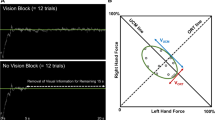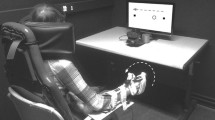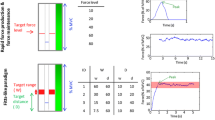Abstract
Action perception and action production are tightly linked and elicit bi-directional influences on each other when performed simultaneously. In this study, we investigated whether age-related differences in manual fine-motor competence and/or age affect the (interfering) influence of action production on simultaneous action perception. In a cross-sectional eye-tracking study, participants of a broad age range (N = 181, 20–80 years) observed a manual grasp-and-transport action while performing an additional motor or cognitive distractor task. Action perception was measured via participants’ frequency of anticipatory gaze shifts towards the action goal. Manual fine-motor competence was assessed with the Motor Performance Series. The interference effect in action perception was greater in the motor than the cognitive distractor task. Furthermore, manual fine-motor competence and age in years were both associated with this interference. The better the participants’ manual fine-motor competence and the younger they were, the smaller the interference effect. However, when both influencing factors (age and fine-motor competence) were taken into account, a model including only age-related differences in manual fine-motor competence best fit with our data. These results add to the existing literature that motor competence and its age-related differences influence the interference effects between action perception and production.



Similar content being viewed by others
References
Aglioti, S. M., Cesari, P., Romani, M., & Urgesi, C. (2008). Action anticipation and motor resonance in elite basketball players. Nature Neuroscience, 11(9), 1109–1116. https://doi.org/10.1038/nn.2182.
Balser, N., Lorey, B., Pilgramm, S., Naumann, T., Kindermann, S., Stark, R., & Munzert, J. (2014). The influence of expertise on brain activation of the action observation network during anticipation of tennis and volleyball serves. Frontiers in Human Neuroscience, 8, 1–13. https://doi.org/10.3389/fnhum.2014.00568.
Bates, D. M., Maechler, M., Bolker, B., & Walker, S. (2015). Fitting linear mixed-effects models using lme4. Journal of Statistical Software, 67(1), 1–48. https://doi.org/10.18637/jss.v067.i01.
Bhalla, M., & Proffitt, D. R. (1999). Visual-motor recalibration in geographical slant perception. Journal of Experimental Psychology: Human Perception and Performance, 25(4), 1076–1096. https://doi.org/10.1037/0096-1523.25.4.1076.
Binder, J. C., Martin, M., Zöllig, J., Röcke, C., Mérillat, S., Eschen, A., & Shing, Y. L. (2016). Multi-domain training enhances attentional control. Psychology and Aging, 31(4), 390–408. https://doi.org/10.1037/pag0000081.
Blakemore, S. J., & Frith, C. (2005). The role of motor contagion in the prediction of action. Neuropsychologia, 43, 260–267. https://doi.org/10.1016/j.neuropsychologia.2004.11.012.
Brass, M., Bekkering, H., & Prinz, W. (2001a). Movement observation affects movement execution in a simple response task. Acta Psychologica, 106, 3–22. https://doi.org/10.1016/S0001-6918(00)00024-X.
Brass, M., Zysset, S., & Von Cramon, D. Y. (2001b). The inhibition of imitative response tendencies. Neuroimage, 14, 1416–1423. https://doi.org/10.1006/nimg.2001.0944.
Calvo-Merino, B., Grèzes, J., Glaser, D. E., Passingham, R. E., & Haggard, P. (2006). Seeing or doing? Influence of visual and motor familiarity in action observation. Current Biology, 16, 1905–1910. https://doi.org/10.1016/j.cub.2006.07.065.
Cannon, E. N., & Woodward, A. L. (2008). Action anticipation and interference: a test of prospective gaze. In B. C. Love, K. McRae, & V. M. Sloutsky (Eds.), Proceedings of the 30th annual conference of the Cognitive Science Society (pp. 981–985). Austin, TX: Cognitive Science Society. doi:10.1016/j.biotechadv.2011.08.021. Secreted.
Capa, L., Marshall, P. J., & Bouquet, A. (2011). Does motor interference arise from mirror system activation? The effect of prior visuo-motor practice on automatic imitation. Psychological Research, 75, 152–157. https://doi.org/10.1007/s00426-010-0303-6.
Catmur, C. (2016). Automatic imitation? Imitative compatibility affects responses at high perceptual load. Journal of Experimental Psychology: Human Perception and Performance, 42(4), 530–539. https://doi.org/10.1037/xhp0000166.
Catmur, C., Gillmeister, H., Bird, G., Liepelt, R., Brass, M., & Heyes, C. (2008). Through the looking glass: Counter-mirror activation following incompatible sensorimotor learning. European Journal of Neuroscience, 28(6), 1208–1215. https://doi.org/10.1111/j.1460-9568.2008.06419.x.
Catmur, C., Walsh, V., & Heyes, C. (2009). Associative sequence learning: the role of experience in the development of imitation and the mirror system. Philosophical Transactions of the Royal Society of London Series B Biological Sciences, 364(1528), 2369–2380. https://doi.org/10.1098/rstb.2009.0048.
Daum, M. M., Gampe, A., Wronski, C., & Attig, M. (2016). Effects of movement distance, duration, velocity, and type on action prediction in 12-month-olds. Infant Behavior and Development, 43, 75–84. https://doi.org/10.1016/j.infbeh.2016.03.002.
Diersch, N., Cross, E. S., Stadler, W., Schütz-Bosbach, S., & Rieger, M. (2012). Representing others’ actions: The role of expertise in the aging mind. Psychological Research, 76(4), 525–541. https://doi.org/10.1007/s00426-011-0404-x.
Diersch, N., Mueller, K., Cross, E. S., Stadler, W., Rieger, M., & Schütz-Bosbach, S. (2013). Action prediction in younger versus older adults: Neural correlates of motor familiarity. PLoS One, 8(5), e64195. https://doi.org/10.1371/journal.pone.0064195.
Edwards, M. G., Humphreys, G. W., & Castiello, U. (2003). Motor facilitation following action observation: A behavioural study in prehensile action. Brain and Cognition, 53, 495–502. https://doi.org/10.1016/S0278-2626(03)00210-0.
Elsner, C., D’Ausilio, A., Gredebäck, G., Falck-Ytter, T., & Fadiga, L. (2013). The motor cortex is causally related to predictive eye movements during action observation. Neuropsychologia, 51, 488–492. https://doi.org/10.1016/j.neuropsychologia.2012.12.007.
Fadiga, L., Fogassi, L., Pavesi, G., & Rizzolatti, G. (1995). Motor facilitation during action observation: a magnetic stimulation study. Journal of Neurophysiology, 73(6), 2608–2611.
Falck-Ytter, T., Gredebäck, G., & von Hofsten, C. (2006). Infants predict other people’s action goals. Nature Neuroscience, 9(7), 878–879. https://doi.org/10.1038/nn1729.
Farrow, D., & Abernethy, B. (2003). Do expertise and the degree of perception—action coupling affect natural anticipatory performance? Perception, 32(9), 1127–1139. https://doi.org/10.1068/p3323.
Flanagan, J. R., & Johansson, R. S. (2003). Action plans used in action observation. Nature, 424, 769–771. https://doi.org/10.1038/nature01861.
Forstmann, B. U., Tittgemeyer, M., Wagenmakers, E.-J., Derrfuss, J., Imperati, D., & Brown, S. (2011). The speed-accuracy tradeoff in the elderly brain: A structural model-based approach. The Journal of Neuroscience, 31(47), 17242–17249. https://doi.org/10.1523/JNEUROSCI.0309-11.2011.
Gabbard, C., Caçola, P., & Cordova, A. (2011). Is there an advanced aging effect on the ability to mentally represent action? Archives of Gerontology and Geriatrics, 53(2), 206–209. https://doi.org/10.1016/j.archger.2010.10.006.
Gallese, V., Fadiga, L., Fogassi, L., & Rizzolatti, G. (1996). Action recognition in the premotor cortex. Brain, 119, 593–609. https://doi.org/10.1093/brain/119.2.593.
Gesierich, B., Bruzzo, A., Ottoboni, G., & Finos, L. (2008). Human gaze behaviour during action execution and observation. Acta Psychologica, 128, 324–330. https://doi.org/10.1016/j.actpsy.2008.03.006.
Hamilton, A., Wolpert, D., & Frith, U. (2004). Your own action influences how you perceive another person’s action. Current Biology, 14, 493–498. https://doi.org/10.1016/j.cub.2004.03.007.
Hardwick, R. M., & Edwards, M. G. (2012). Motor interference and facilitation arising from observed movement kinematics. The Quarterly Journal of Experimental Psychology, 65(5), 840–847. https://doi.org/10.1080/17470218.2012.672995.
Haslinger, B., Erhard, P., Altenmüller, E., Schroeder, U., Boecker, H., & Ceballos-Baumann, A. O. (2005). Transmodal sensorimotor networks during action observation in professional pianists. Journal of Cognitive Neuroscience, 17(2), 282–293. https://doi.org/10.1162/0898929053124893.
Haueisen, J., & Knösche, T. R. (2001). Involuntary motor activity in pianists evoked by music perception. Journal of Cognitive Neuroscience, 13(6), 786–792. https://doi.org/10.1162/08989290152541449.
Haywood, K. M., & Getchell, N. (2005). Life span motor development. Champaign: Human Kinetics.
Hecht, H., Vogt, S., & Prinz, W. (2001). Motor learning enhances perceptual judgment: A case for action-perception transfer. Psychological Research, 65, 3–14. https://doi.org/10.1007/s004260000043.
Heyes, C. (2010). Where do mirror neurons come from? Neuroscience and Biobehavioral Reviews, 34(4), 575–583. https://doi.org/10.1016/j.neubiorev.2009.11.007.
Hommel, B., Müsseler, J., Aschersleben, G., & Prinz, W. (2001). The theory of event coding (TEC): A framework for perception and action planning. The Behavioral and Brain Sciences, 24, 849–937. https://doi.org/10.1017/S0140525X01000103.
Houx, P. J., & Jolles, J. (1993). Age-related decline of psychomotor speed: Effects of age, brain health, sex, and education. Perceptual and Motor Skills, 76, 195–211. https://doi.org/10.2466/pms.1993.76.1.195.
Iacoboni, M., Woods, R. P., Brass, M., Bekkering, H., Mazziotta, J. C., & Rizzolatti, G. (1999). Cortical mechanisms of human imitation. Science, 286(5449), 2526–2528. https://doi.org/10.1126/science.286.5449.2526.
Jacobs, A., & Shiffrar, M. (2005). Walking perception by walking observers. Journal of Experimental Psychology: Human Perception and Performance, 31(1), 157–169. https://doi.org/10.1167/4.8.218.
Karni, A., Meyer, G., Rey-Hipolito, C., Jezzard, P., Adams, M. M., Turner, R., & Ungerleider, L. G. (1998). The acquisition of skilled motor performance: Fast and slow experience-driven changes in primary motor cortex. PNAS, 95(3), 861–868.
Kattenstroth, J.-C., Kolankowska, I., Kalisch, T., & Dinse, H. R. (2010). Superior sensory, motor, and cognitive performance in elderly individuals with multi-year dancing activities. Frontiers in Aging Neuroscience, 2, 1–9. https://doi.org/10.3389/fnagi.2010.00031.
Kauranen, K., & Vanharanta, H. (1996). Aging, gender, and handedness in motor performance of upper and lower extremities’. Perceptual and Motor Skills, 82, 515–525. https://doi.org/10.2466/pms.1996.82.2.515.
Kilner, J. M., Paulignan, Y., & Blakemore, S. J. (2003). An interference effect of observed biological movement on action. Current Biology, 13, 522–525. https://doi.org/10.1016/S0960-9822(03)00165-9.
Knoblich, G., & Flach, R. (2001). Predicting the effects of actions: Interactions of perception and action. Psychological Science, 12(6), 467–472. https://doi.org/10.1111/1467-9280.00387.
Knoblich, G., Seigerschmidt, E., Flach, R., & Prinz, W. (2002). Authorship effects in the prediction of handwriting strokes: Evidence for action simulation during action perception. The Quarterly Journal of Experimental Psychology, 55(3), 1027–1046. https://doi.org/10.1080/02724980143000631.
Koppelmans, V., Hirsiger, S., Mérillat, S., & Seidler, R. D. (2015). Cerebellar gray and white matter volume and their relation with age and manual motor performance in healthy older adults. Human Brain Mapping, 2363(February), 2352–2363. https://doi.org/10.1002/hbm.22775.
Krampe, R. T. (2002). Aging, expertise and fine motor movement. Neuroscience and Biobehavioral Reviews, 26, 769–776. https://doi.org/10.1016/S0149-7634(02)00064-7.
Léonard, G., & Tremblay, F. (2008). Corticomotor facilitation associated with observation and imagery of hand actions is impaired in Parkinson’s disease. Experimental Brain Research, 185(2), 249–257. https://doi.org/10.1007/s00221-007-1150-6.
Loeffler, J., Raab, M., Cañal-Bruland, R., & Rodger, M. (2016). A lifespan perspective on embodied cognition. Frontiers in Psychology, 7, 1–6. https://doi.org/10.3389/fpsyg.2016.00845.
Marty, B., Bourguignon, M., Jousmäki, V., Wens, V., Op de Beeck, M., Van Bogaert, P., & De Tiège, X. (2015). Cortical kinematic processing of executed and observed goal-directed hand actions. NeuroImage, 119, 221–228. https://doi.org/10.1016/j.neuroimage.2015.06.064.
Matsuzaka, Y., Picard, N., & Strick, P. L. (2007). Skill representation in the primary motor cortex after long-term practice. Journal of Neurophysiology, 97, 1819–1832. https://doi.org/10.1152/jn.00784.2006.The.
Maylor, E. A., Birak, K. S., & Schlaghecken, F. (2011). Inhibitory motor control in old age: Evidence for de-automatization. Frontiers in Psychology, 2, 1–9. https://doi.org/10.3389/fpsyg.2011.00132.
Melzer, A., Prinz, W., & Daum, M. (2012). Production and perception of contralateral reaching: A close link by 12 months of age. Infant Behavior and Development, 35(3), 570–579. https://doi.org/10.1016/j.infbeh.2012.05.003.
Ménoret, M., Curie, A., Portes, V., Nazir, T. A., & Paulignan, Y. (2013). Motor resonance facilitates movement execution: An ERP and kinematic study. Frontiers in Human Neuroscience, 7, 1–11. https://doi.org/10.3389/fnhum.2013.00646.
Miall, R. C., Stanley, J., Todhunter, S., Levick, C., Lindo, S., & Miall, J. D. (2006). Performing hand actions assists the visual discrimination of similar hand postures. Neuropsychologia, 44, 966–976. https://doi.org/10.1016/j.neuropsychologia.2005.09.006.
Möller, C., Zimmer, H. D., & Aschersleben, G. (2015). Effects of short-term experience on anticipatory eye movements during action observation. Experimental Brain Research, 233, 69–77. https://doi.org/10.1007/s00221-014-4091-x.
Neuwirth, W., & Benesch, M. (2011). Motorische Leistungsserie. Wiener Testsystem (WTS) [Motor performance series: Vienna Test System]. Mölding, Austria: Schufried.
Oldfield, R. C. (1971). The assessment and analysis of handedness: The Edinburgh inventory. Neuropsychologia, 9(1), 97–113. https://doi.org/10.1016/0028-3932(71)90067-4.
Park, D. C., Hedden, T., Davidson, N. S., Smith, A. D., & Smith, P. K. (2002). Models of visuospatial and verbal memory across the adult life span. Psychology and Aging, 17(2), 299–320. https://doi.org/10.1037//0882-7974.17.2.299.
Personnier, P., Kubicki, A., Laroche, D., & Papaxanthis, C. (2010). Temporal features of imagined locomotion in normal aging. Neuroscience Letters, 476(3), 146–149. https://doi.org/10.1016/j.neulet.2010.04.017.
Personnier, P., Paizis, C., Ballay, Y., & Papaxanthis, C. (2008). Mentally represented motor actions in normal aging: II. The influence of the gravito-inertial context on the duration of overt and covert arm movements. Behavioural Brain Research, 186(2), 273–283. https://doi.org/10.1016/j.bbr.2007.08.018.
Platz, T., Prass, K., Denzler, P., & Bock, S. (1999). Testing a motor performance series and a kinematic motion analysis as measures of performance in high-functioning stroke patients: Reliability, validity, and responsiveness to therapeutic intervention. Archives of Physical Medicine and Rehabilitation, 80(3), 270–277. https://doi.org/10.1016/S0003-9993(99)90137-5.
Poldrack, R. A., Sabb, F. W., Foerde, K., Tom, S. M., Asarnow, R. F., Bookheimer, S. Y., & Knowlton, B. J. (2005). The neural correlates of motor skill automaticity. The Journal of Neuroscience, 25(22), 5356–5364. https://doi.org/10.1523/JNEUROSCI.3880-04.2005.
Press, C., Bird, G., Walsh, E., & Heyes, C. (2008). Automatic imitation of intransitive actions. Brain and Cognition, 67(1), 44–50. https://doi.org/10.1016/j.bandc.2007.11.001.
Press, C., Heyes, C., & Kilner, J. (2011). Learning to understand others’ actions. Biology Letters, 7(3), 457–460. https://doi.org/10.1098/rsbl.2010.0850.
Prinz, W. (1990). A common coding approach to perception and action. In O. Neumann & W. Prinz (Eds.), Relationships between perception and action. Current approaches (pp. 167–201). Berlin: Springer.
Prinz, W. (1997). Perception and action planning. European Journal of Cognitive Psychology, 9(2), 129–154. https://doi.org/10.1080/713752551.
R Core Team. (2012). R: A language and environment for statistical computing. Vienna: R Foundation for Statistical Computing.
Rémy, F., Wenderoth, N., Lipkens, K., & Swinnen, S. P. (2010). Dual-task interference during initial learning of a new motor task results from competition for the same brain areas. Neuropsychologia, 48(9), 2517–2527. https://doi.org/10.1016/j.neuropsychologia.2010.04.026.
Reuter, E.-M., Behrens, M., & Zschorlich, V. R. (2015). Age-related differences in corticomotor facilitation indicate dedifferentiation in motor planning. Experimental Gerontology, 65, 79–84. https://doi.org/10.1016/j.exger.2015.03.008.
Roberts, J. W., Katayama, O., Lung, T., Constable, M. D., Elliott, D., Lyons, J. L., & Welsh, T. N. (2016). The modulation of motor contagion by intrapersonal sensorimotor experience. Neuroscience Letters, 624, 42–46. https://doi.org/10.1016/j.neulet.2016.04.063.
Rosander, K., & von Hofsten, C. (2011). Predictive gaze shifts elicited during observed and performed actions in 10-month-old infants and adults. Neuropsychologia, 49(10), 2911–2917. https://doi.org/10.1016/j.neuropsychologia.2011.06.018.
Saimpont, A., Mourey, F., Manckoundia, P., Pfitzenmeyer, P., & Pozzo, T. (2010). Aging affects the mental simulation/planning of the “rising from the floor” sequence. Archives of Gerontology and Geriatrics, 51, 41–45. https://doi.org/10.1016/j.archger.2009.11.010.
Schorer, J., & Baker, J. (2015). An exploratory study of aging and perceptual-motor expertise in handball goalkeepers. Experimental Aging Research, 35(1), 1–19. https://doi.org/10.1080/03610730802544641.
Seidler, R. D., Erdeniz, B., Koppelmans, V., Hirsiger, S., Mérillat, S., & Jäncke, L. (2015). Associations between age, motor function, and resting state sensorimotor network connectivity in healthy older adults. Neuroimage, 108, 47–59. https://doi.org/10.1016/j.neuroimage.2014.12.023.
Seidler, R. D., & Stelmach, G. E. (1995). Reduction in sensorimotor control with age. Quest, 47(3), 386–394. https://doi.org/10.1080/00336297.1995.10484165.
Skoura, X., Papaxanthis, C., Vinter, A., & Pozzo, T. (2005). Mentally represented motor actions in normal aging: I. Age effects on the temporal features of overt and covert execution of actions. Behavioural Brain Research, 165, 229–239. https://doi.org/10.1016/j.bbr.2005.07.023.
Stevens, J. A., Fonlupt, P., Shiffrar, M., & Decety, J. (2000). New aspects of motion perception: Selective neural encoding of apparent human movements. Neuroreport, 11(1), 109–115. https://doi.org/10.1097/00001756-200001170-00022.
Sturm, W., & Büssig, A. (1985). Ergänzende Normierungsdaten und Retest-Reliabilitätskoeffizienten zur Motorischen Leistungsserie (MLS) nach Schoppe [Supplementary standarization and retest reliability coefficents of the Motorische Leistungsserie (MLS) by Schoppe]. Diagnostica, 31, 234–245.
Sugovic, M., & Witt, J. K. (2013). An older view on distance perception: Older adults perceive walkable extents as farther. Experimental Brain Research, 226(3), 383–391. https://doi.org/10.1007/s00221-013-3447-y.
Urgesi, C., Moro, V., Candidi, M., & Aglioti, S. M. (2006). Mapping implied body actions in the human motor system. The Journal of Neuroscience, 26(30), 7942–7949. https://doi.org/10.1523/JNEUROSCI.1289-06.2006.
Valchev, N., Tidoni, E., de Hamilton, A. F. C., Gazzola, V., & Avenanti, A. (2017). Primary somatosensory cortex necessary for the perception of weight from other people’s action: A continuous theta-burst TMS experiment. Neuroimage, 152, 195–206. https://doi.org/10.1016/j.neuroimage.2017.02.075.
von Hofsten, C. (2004). An action perspective on motor development. Trends in Cognitive Science, 8(6), 265–272. https://doi.org/10.1016/j.tics.2004.04.002.
Wohlschläger, A., & Bekkering, H. (2002). Is human imitation based on a mirror-neurone system? Some behavioural evidence. Experimental Brain Research, 143, 335–341. https://doi.org/10.1007/s00221-001-0993-5.
Wu, T., & Hallett, M. (2005). The influence of normal human ageing on automatic movements. The Journal of Physiology, 562, 605–615. https://doi.org/10.1113/jphysiol.2004.076042.
Wu, T., Kansaku, K., & Hallett, M. (2004). How self-initiated memorized movements become automatic: A functional MRI study. Journal of Neurophysiology, 91, 1690–1698. https://doi.org/10.1152/jn.01052.2003.
Acknowledgements
While working on her dissertation, Stephanie Wermelinger was a pre-doctoral fellow of the International Max Planck Research School on the Life Course (LIFE, http://www.imprs-life.mpg.de; participating institutions: Max Planck Institute for Human Development, Freie Universität Berlin, Humboldt-Universität zu Berlin, University of Michigan, University of Virginia, University of Zurich). This project is funded by the Swiss National Science Foundation (Grant number: S-63216-03-01). We thank the editor and reviewers for helpful comments on previous versions of this manuscript. We also thank Jannis Behr for his help with the data collection.
Author information
Authors and Affiliations
Corresponding author
Ethics declarations
Funding
This study was funded by the Swiss National Science Foundation (Grant number: S-63216-03-01).
Conflict of interest
All authors declare that they have no conflict of interest.
Ethical approval
All procedures were in accordance with the ethical standards of the institutional research committee and with the 1964 Helsinki declaration and its later amendments.
Informed consent
Informed consent was obtained from all individual participants included in the study.
Rights and permissions
About this article
Cite this article
Wermelinger, S., Gampe, A. & Daum, M.M. Higher levels of motor competence are associated with reduced interference in action perception across the lifespan. Psychological Research 83, 432–444 (2019). https://doi.org/10.1007/s00426-017-0941-z
Received:
Accepted:
Published:
Issue Date:
DOI: https://doi.org/10.1007/s00426-017-0941-z




